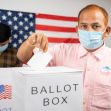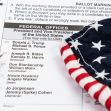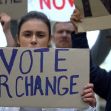In 2018, Florida voters filled out their ballots with a special referendum: whether or not the over 150 years-old state law dictating felon disenfranchisement should stand. With over ten percent of eligible adults in Florida rendered ineligible to vote due to the law, which required an often-years-long process of applications and hearings to plead with state officials for reinstatement—the vote could have, theoretically, restored the right to vote to nearly 1.5 million Floridians.
Nearly 65 percent of the state voted for Amendment 4, believing it would effectively reinstate voting rights to convicted felons who had served their time (excluding felonies of murder or sexual offenses). The amendment, which said that “any disqualification from voting arising from a felony conviction shall terminate and voting rights shall be restored upon completion of all terms of sentence including parole or probation,” passed successfully.
Recently, however, an appeals court abruptly halted the new law’s progress with its decision in Jones v. Governor of Florida. On September 11, 2020, with precious little time left before the Presidential Election, an 11th Circuit Court of Appeals opinion authored by Judge William Pryor blocked hundreds of thousands of voters from participating in the democratic process. Five judges appointed by Donald Trump joined Pryor’s opinion.
Felony charges in the state include well over 500 infractions, including trespassing on construction sites, drug possession, and disturbing lobster traps. Each of these crimes stripped Floridians of the right to vote no differently than homicide. Many lost their voting rights as soon as they turned 18, disenfranchised for decades to come.
Amendment 4 to the Florida Constitution should have redeemed some of this injustice, but it bears the dire misfortune of interpretation. The court ruled that “completion of all terms of sentence” would include the payment of any and all fees, fines, and costs incurred by the rehabilitated felons—information often found exclusively in the original sentencing documents, which frequently requires a fee just to access.
Other cases lack records of payments at all, leaving tens of thousands stalled in their ability to register or vote. “Florida has no record of restitution payments at all, except in the smaller number of cases when restitution is payable to or through the Clerk of Courts or the Department of Corrections,” Judge Adalberto Jordan wrote in a dissenting opinion for the Jones case.
Before the amendment, Florida state officials and the governor would meet four times a year for clemency hearings, meeting with rehabilitated felons who would essentially plead for their voting rights—a decision left entirely to the whim of the governor. Even getting the hearing was a shockingly drawn-out process; many could wait a full decade to be granted a hearing, some of whom already had to wait seven years after their probation’s conclusion to even apply for the hearing in the first place.
Former Governor Charlie Crist granted about 150,000 felons their voting rights during his four years in office. The next Governor, Rick Scott, over seven years, reinstated the right to vote to less than 3,000 of his constituents.
“Clemency is…there’s no standard, we can do whatever we want,” Scott said in one such hearing in 2016.
A handful of states maintain some form of felon disenfranchisement law. For the most part, felons in the U.S. only lose the right to vote while actively serving sentences or parole; states that do still impose restrictions like Florida’s have blatant historical racism to blame at the laws’ roots.
The southern states which implemented felon disenfranchisement into their legislation were not subtle regarding their intent: Virginia implemented its plan into the state constitution to “eliminate the darkie as a political factor,” said Delegate Carter Glass in 1901, to assure the state would uniformly provide for “the complete supremacy of the white race in the affairs of government.”
“Discrimination! Why that is precisely what we propose,” Glass said.
Florida’s criminal disenfranchisement law has a similar pedigree, originally targeting former slaves for minor offenses with the installation of “Black Codes” to legally and systemically remove BIPOC voices from the ballots. Florida law has effectively prevented about 20 percent of otherwise eligible Black voters from casting ballots. Though the state has leaned both right and left in past elections, the sheer amount of potentially left-leaning votes from re-enfranchised BIPOC would likely factor into future polls drastically. Amendment 4 was a long-overdue effort to address these disproportionate (and historically racist) effects of Florida’s felon disenfranchisement laws.
But after the amendment passed in 2018, the Republican state legislature quickly responded by including an aggressive interpretation of the “completion of all terms” provision in its implementing legislation. Out of over a million voters who would have automatically regained their voting rights, nearly 80 percent were suddenly subject to paying off confusing and difficult-to-ascertain fees first.
Critics of the move see it as an unconstitutional poll tax. Voting qualifications were left to the states to decide, but the Constitution does dictate certain parameters for voter rights. The U.S. Congress passed the 24th Amendment in 1962 to abolish poll taxes, declaring that voting rights “shall not be denied or abridged by the United States or any State by reason of failure to pay poll tax or other tax.”
Poll taxes were historically used to keep Americans who did not own property from participating in the democratic process, but this method was eventually discarded state-by-state as the taxes showed clear discriminatory intent. The right to vote wasn’t significantly extended federally until the ratification of the 15th Amendment in 1870, which allowed men to vote regardless of “race, color, or previous condition of servitude” (just men—women’s suffrage came much later; Susan B. Anthony was actually put on trial for casting her vote in 1872).
But the poll tax found renewed vigor with the passage of the 15th Amendment: in 1889, Florida led the charge to undermine the rights of Black voters. The formerly Confederate states all joined in, but Florida was the pioneer among the states of imposing poll taxes, literacy tests—and felon disenfranchisement. According to the National Constitution Center, “The historical record is filled with racially derogatory statements from delegates at State constitutional conventions who believed poll taxes and other devices would suppress Black voter registration and turnout.” There is and was no question or subtlety in the intent and successful effect of such legislation.
With the 24th Amendment, federal elections found sanctuary from the poll tax, though state ballots were still subject to the option. It wasn’t until Harper v. Virginia Board of Elections in 1966 that the Supreme Court finally extended the poll tax prohibition to state and local elections.
Harper’s 6-3 majority opinion ruled that “conditioning of the right to vote on the payment of a fee or tax violates the Equal Protection Clause of the Fourteenth Amendment.” The Court went on to say that “fee payments or wealth, like race, creed, or color, are unrelated to the citizen’s ability to participate intelligently in the electoral process.” Drawing such lines on who may vote, they said, could no longer be allowed to cause “invidious discrimination.”
Yet, such discrimination faces a less severe manner of legal scrutiny when criminal activity is involved. If the Harper ruling prohibited hinging voting rights on wealth, then how is it a citizen can still be barred from suffrage solely on account of unpaid government fees? The former felons in question (precluding murderers and sexual offenders) have served their time, completed probation, and have in all respects legitimately reentered society—many simply do not have the financial means to immediately cover lingering statutory expenses. On top of the requirement of surmising that payments are due, potential voters also have the added circus of finding out how much they actually owe, a process of hoop-jumping for which Florida is infamously disorganized.
This past May, a federal judge ruled that the disenfranchisement could not be applied to felons who either couldn’t access their fee requirements or who were financially unable to pay—with Harper in mind, the decision seemed reasonable, but Pryor’s court reversed it anyway. With the disarray of the state’s ability to even confirm or obtain information on so many, they rendered the amendment futile for many in the upcoming election.
As a historically consistent swing state, Florida is anticipated to play an important role in the November election results. With 29 electoral college votes, a grip on the Sunshine State boasts an enviable trophy for the presidential candidates—and although Mr. Trump claimed the state in 2016, he’s trailing so far this year by a slim margin. In the past, presidential elections have been decided by as few as 537 votes in the state alone. In fact, when that was the margin in the 2000 election, 12,000 votes had been thrown out erroneously—because Florida had mistaken those 12,000 voters for felons, about 44 percent of which were identified as Black voters. At the time, an estimated 800,000 to 900,000 other non-voting Floridians were actual former felons unable to participate in the election.
Donations, some from high-profile sources, have attempted to reconcile the debts on behalf of former felons, but the amount stretches to hundreds of millions of dollars and the state closes its doors on registering new voters almost a full month before Election Day. Governor DeSantis will likely enjoy maintaining his vicelike grip on the voting landscape, responsible for hundreds of thousands of democratic voices lost to his state’s deeply racist legislative history—though, perhaps, sleeping at night with that knowledge might now be a bit more difficult.






